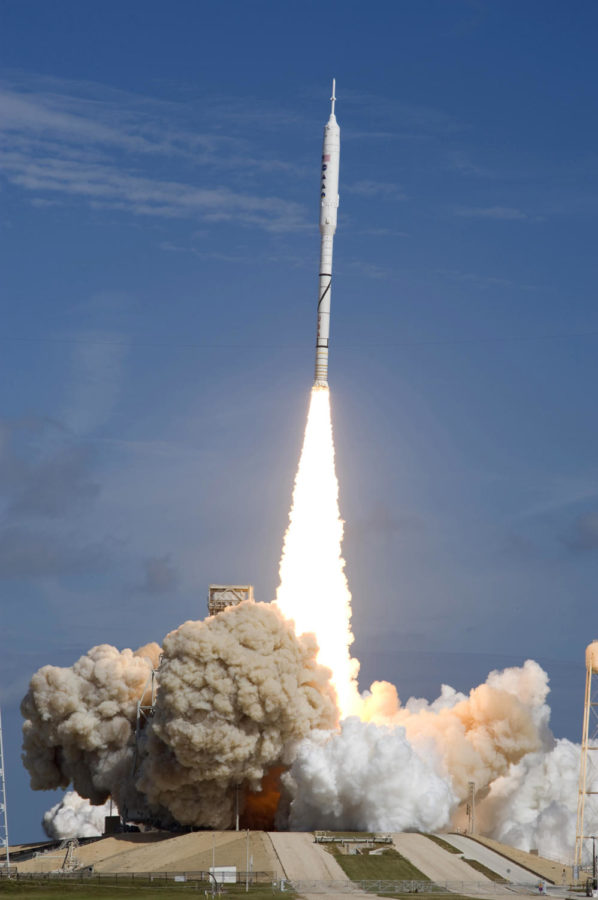Gross: Privatized space exploration offers new chance for U.S. to re-enter the race
With lessened government funding for space exploration, companies such as Google are encouraging the pursuit of new knowledge of the universe outside our own planet.
December 10, 2013
As our economy slowly recovers from its lapse a few years ago, many have begun to urge increased funding be put back toward many programs. One of these programs is NASA, from which President Barack Obama cut funding in 2010. The president’s budget for NASA in 2011 didn’t include funding for manned space expeditions or the Constellation Program, which would have provided upkeep for space shuttles.
Though NASA has lost attention since the great global “space race” of the 1960s and ‘70s, many still recognize space exploration as a venture worthy of many tax dollars. Unfortunately, it seems that our government is not one of those groups. The 2013 budget for NASA was diminished even further, with nearly $310 million cut. Government spokespersons defend the budget by saying that the United States still plans to remain in the foreground of space exploration. However, it is difficult to see how that will be accomplished with lowered budgets. It seems that federal curiosity died at the turn of the millennia.
To remedy this situation, we can protest the cuts and say loud and clear to our government that space exploration is still a priority, not a field that we feel should be left to Russia, India, China or any other country. However, as fiscal appropriations are made annually, and our government has recently proven itself to be a stagnant pool for legislation, this may not be enough.
Luckily, technology and understanding of the outer world have expanded enough that space exploration is no longer impossible for any but government to fund. To be sure, it is still quite pricey — no mom and pop shops are going to be flinging shuttles into orbit. Particularly wealthy companies with interest or business in the area can now hope to invest in space exploration.
To help spur these companies on, Google has created the Lunar XPRIZE. XPRIZE is a contest that will award a grand prize of $30 million to the first private company that can accomplish a certain mission: design and land a robotic spacecraft on the moon. More specifically, the company’s robot must land, then travel 500 meters in any given direction: above, below or on the surface. Proof takes the form of two videos, or “mooncasts,” taken and sent back to Earth.
Cash prizes offered by companies such as Google for amazing accomplishments are not all that new, but the XPRIZE contest is the largest cash prize to be offered by anyone to date. It makes sense, when the cost of space and lunar expeditions are taken into account. A prize so large ensures that companies that undertake this challenge may receive at least partial compensation upon success.
So why is Google interested in the future of space exploration? There has to be some form of corporate motivation for this vast expenditure. But what the XPRIZE website says is: “Google Lunar XPRIZE aims to create a new ‘Apollo’ moment for this generation.” Ignoring unspoken motivations, it seems that Google really just wants to spur on galactic movement. As a corporation, Google seems to have recognized that the U.S. government has lost the desire to fund NASA and other space ventures, and it has also recognized that someone else must pick up the burden.
The argument for privatized space exploration is not new, by any means. The largest problem that private corporations have run into so far is finding ways to monetize it, as a major fiscal motivator is as of yet absent. However, each year we find ourselves closer to being able to commercialize space travel — the dreamed-of lunar tourism locale. As a result, “tickets” to space are already being offered by some corporations.
Different “adventures” that are being marketed include a trip around — but not on — the moon, trips around Mars and even a “one-way trip” to Mars for approximately $6 billion. Though obviously far from the price bracket of most average consumers, the fact that these tickets to space can be sold at all shows the direction in which privatized space exploration is moving.
However, until we reach a point that it is viable to charge large groups of people for these tourism trips, or if we find some key resource off-planet, it will be hard to get many companies to spend the necessary money.
What Google is doing by creating the XPRIZE contest is getting this trend started. If we can’t rely on our government to resupply NASA’s funding and delve into space, then someone else must. Other countries have made it clear that the space race of the 21st century is still going strong, but we need to find a way for America to re-enter it.

















